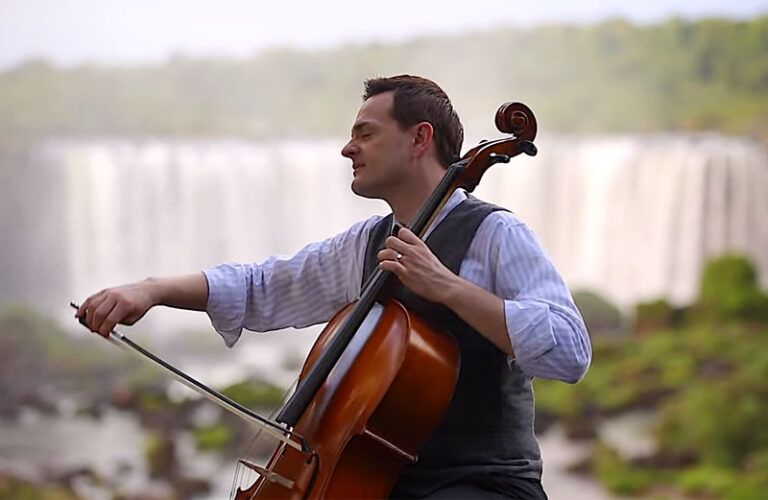
A Conversation with Paul Young, Author of ‘The Shack’
The author of the best-selling novel The Shack discusses his book with Guideposts.
View Transcript
An Interview with William Paul Young
Video 1
How do you define Grace?
Grace is the affection of God—or exhibited to anybody—where it is not based on performance, not based on the performance of an expectation, of living up to one. It’s the extension of goodness and kindness and light that fundamentally is sourced in who God is.
God is kind. When we talk about the fruit of the spirit, we’re describing the very nature and character of God. You know, I think God is involved in every human being’s life, and I think He is constantly working.
Romans says no one’s even sought for God at all, so any inclination we have is because the Holy Spirit is messing with us, you know? And then, in the middle of that, beginning to change and grace begins to flow from inside out. And even people who don’t want a relationship with God or are afraid of one or don’t even acknowledge one, the Holy Spirit’s still working.
And you can hear it in their music, you can hear it in their art, you can hear it in their conversations. When you look at a man who looks at his sweetheart, you can see the presence of God.
It’s grace working through love, yes. And He’s no respecter of persons in that. You know, C. S. Lewis called Him “the Great Interferer,” and I just that He’s interfering all the time—out of love.
Video 2
How did you come up with the Holy Spirit’s name?
I was on Skype with a woman from India, and her company was looking for a web-conferencing solution the same day I’m looking for a name for the Holy Spirit, so I figure it’s a good trade.
So I talked to [her], and I said, “Would you give me words for the wind as a metaphor for the Holy Spirit?” And she does. She gives me about a dozen words, and Sarayu was one of them. I liked it a lot, just the sound of it.
So I said, “You ever name your children after this?” And she said, “No, but we have a river named Sarayu.” I thought, That’s good, because the wind is a metaphor in scripture, but so is water—the river of life, and out of your innermost being, rivers of living water. It’s all metaphor for the light and spirit.
The most important question is, what kind of wind is it? Because I didn’t want a tornado or a hurricane or those other kinds of wind you don’t want it to be. So she said, “Sarayu is the common wind that catches you by surprise.”
I went, “Really?” She said, “Yeah, it’s like when you’re so hot, you think you’re going to die. And out of nowhere comes this wind that cools you down and changes everything.” And that became the name of the Holy Spirit. It just fit.
I think as we become less adult and less driven by control and agenda and more childlike, everything begins to catch you by surprise. And I find that God has been involved in the details of my life my whole life. And I just didn’t see it, because I didn’t have the eyes of a child.
I grew up being an adult from the time I was little. It took me 50 years to become a child. The more I enter into that childlike world, of living inside the grace of one day living in a relationship with an adult who actually knows what he’s doing and that I can trust—suddenly there are surprises all around us.
Video 3
Who is Jesus to you?
I just wanted Him to be a Middle Eastern man, a regular person. I didn’t want Him to be super sleek, something that religious advertising and marketing would put together. And I definitely don’t want him to be Anglo-Saxon, blue-eyed, blond-haired with a British accent, which is some of the entertainment industries hoisting an image on us.
For many of us, Jesus is the touchpoint for us. When it comes to God, He’s the one we feel safe with because He’s human; He knows us. And though He’s God, He has set that aside and limited Himself, in order that this relationship would work and that He would be a proper substitution for us, as the whole of humanity. So I wanted Jesus to be just … I wanted him to be a guy, somebody who was definitely a man, but definitely full of laughter and love and kindness and gentleness—and knows how to work.
How do you understand the Trinity?
I didn’t intend to write an incredible book on the Trinity. When I went to Bible school and then some seminary, all the analogies are ways to try to understand the Trinity, for non-relations. Three parts of an orange, three stages of water, you know? What’s that? All I did was describe how they care for one another, what the affection was in that relationship. And all of a sudden, boom, it made sense. Because we are fundamentally relational beings. Frankly, because we’re made in the image of God, who is fundamentally relational. God’s never done anything by himself. He’s never been alone, in that sense.
Video 4
What is the legend of this waterfall?
Two tribes were getting together and part of their celebration, because there was a wedding that was going to take place. An Indian princess, a chief’s daughter from one tribe, was in love with the son of one of the chiefs of another tribe. A sickness broke out and started killing the men of both tribes.
The elders got together, tried to figure out what to do about it. One ofthe old shamans in the tribe said, “When I was a boy, my father told me that a sickness would come one day, and the sickness would only go away if there was an Indian princess who would sacrifice her life.” Well, they voted it down. They said, “We’re not going to do that.”
Well, this man that this princess loved gets very sick, and it looks like he’s going to die. So she slips away, travels all the way down and jumps from the top of Multnomah Falls to her death. The next day everybody gets well. And they can’t figure out why—until they find out she’s missing. And they travel here.
And the chief, whose heart is broken, whose daughter had died—at this point, there were no falls here. It was just that she jumped here—And he said to the Great Spirit, “I need a memorial here.” And the water began coming over the edge, and that created it.
So for a long time, they would say that if you look at certain times, you could almost see her in the falls. And that became the legend of how someone sacrificed their life, which is one of those iconic legends that exists in every culture. The sacrifice of one saves the whole community, same as the idea that Jesus dies for all humanity. He is God who has become flesh in order that He may sacrifice, so that all would have the embrace of God.










